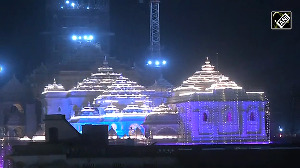Google's just released fourth biannual Transparency Report says that between January and June 2011, the Indian government asked it to remove 358 different items from various Google-owned web services such as Orkut and YouTube.
Google complied in only 51 per cent of cases. The requests were made by various central and state government departments through 68 different requests. This is the fourth such report and it goes against Information and Broadcasting Minister Kapil Sibal's claims that internet companies are not willing to "self-regulate".
Worryingly, the report also confirms allegations that what bothers government officials the most about the internet is not defamation or hate speeches but online criticism of the government.
In a brief note accompanying the report, Google observed, "We received requests from state and local law enforcement agencies to remove YouTube videos that displayed protests against social leaders or used offensive language in reference to religious leaders. We declined the majority of these requests and only locally restricted videos that appeared to violate local laws prohibiting speech that could incite enmity between communities. In addition, we received a request from a local law enforcement agency to remove 236 communities and profiles from Orkut that were critical of a local politician. We did not comply with this request, since the content did not violate community standards or local law."
Google's lawyers review each request to see if it would hold as per Indian laws, and if they think it does, they remove it. They also remove content regularly, whether or not requested by the government, if it violates their terms of service.
While defamation and hate speech are often cited as reasons for greater regulation and control over free speech on the internet, the report shows that requests on these counts were very few.
Thirty nine out of 358 were related to defamation, of which 24 related to Blogspot. Only eight requests were made on account of hate speeches -- six for YouTube and two for Orkut.
Only 20 items were sought to be removed on account of privacy and security, and only one on account of national security and three YouTube videos on account of pornography.
In yet another indication that such content removal requests from India are arbitrary and rarely go through a legal process, the report shows that only three blogger-related items were asked to be removed by court orders.
The report does not indicate any new trend about India as even the earlier report, for July-December 2010, had stated, "We received requests from different law enforcement agencies to remove a blog and YouTube videos that were critical of chief ministers and senior officials of different states. We did not comply with these requests."
Google does not reveal who made requests to remove what and neither does the government.
The four reports that cover the period between July 2009 and June 2011 show that Google has complied with 51 per cent requests by the Indian government in this two-year period.
The first report said that 142 requests were made, but did not reveal the number of items sought to be removed. The three later reports show, however, that India asks for an average of 42.5 items to be removed every month -- or nearly two in three days.










 © 2025
© 2025